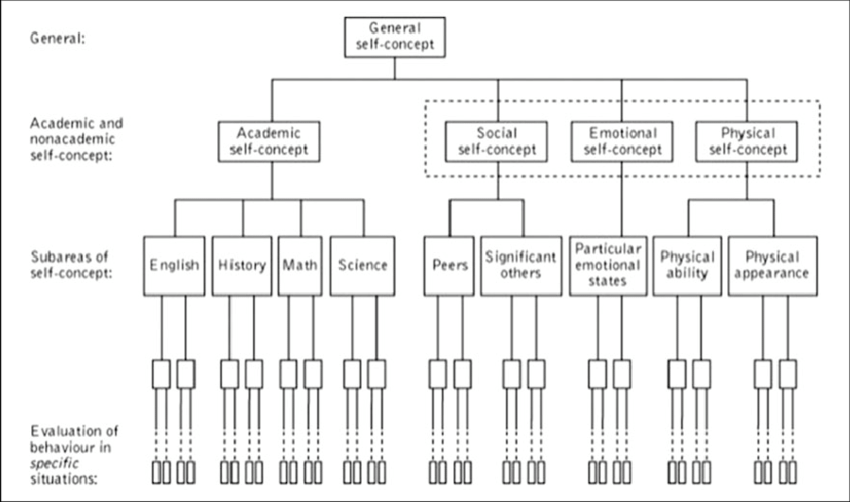Summary
Self-concept is, in general words, is how a person perceives himself. It often answers the question, “who am I”? Therefore, self-concept is the perception of our identity, including physical, emotional, social, spiritual, and other characteristics. Shavelson et al.’s (1976) model divides self-concept into academic, social, emotional, and physical self-concepts, as shown in figure 1. Academic self-concept relates to how well a person feels he can learn, which may be affected by past academic performances. People with high academic self-concept feel they can do well in school work than their counterparts.

Social, emotional, and physical self-concepts describe the non-academic attributes of a person. For instance, social self-concept entails how one perceives oneself in relation to others, and involves relationship building, communication, and empathizing. Physical self-concept refers individual perception of physical abilities and appearance, such as strength, condition, body attractiveness, and sports competence. Facets of self-concept may form a hierarchy from personal experience in a particular situation to the general self-concept at the top (see figure). Like in the case of experience with family, peers, and significant others, the hierarchy will entail general self-concept, social self-concept, peers, or significant other, all the way to the base of the hierarchy.
Self-concept and Self-esteem
Self-concept is how we view our actions, skills, and distinctive qualities, as well as our views about ourselves and others’ reactions. As we grow, we build and control our self-concept based on our knowledge of ourselves. Our relationships with influential people in our daily lives are just one of the many elements that affect how we view ourselves. For example, believing that you are a good friend or that another person is kind is all part of our self-concept. Although it might be a component of self-concept, self-esteem is not self-concept. Self-esteem is the attitude one has toward oneself, such as how much one likes, accepts, and values. The degree to which individuals like, accept, and value themselves contributes to their self-concept.
Self-esteem can be impacted by a variety of factors, such as how you view yourself in relation to others, how others see you, and your place in society. Your adult experience can change how you feel about yourself (self-esteem). For example, if your self-esteem increases later in life, it can improve your self-concept. Self-concept is a general description of who we are, whereas self-esteem is any opinion or judgment we may have of ourselves.
How Physical Activity Can Enhance Self-concept and Self-esteem
In the model in figure 1, physical self-concept entails how individuals feel about their looks, health, physical condition, and overall appearance. Living a sedentary lifestyle has minimal impact on your fitness, energy, general well-being, or sense of self-worth. The advantages of regular exercise include looking appealing, feeling powerful, and having a positive attitude—the characteristics of self-esteem. According to studies, adolescents and adults who engage in regular physical activity have high self-esteem and a positive self-concept, as well as a positive view of their health (Gonzalo et al., 2020). One of the exercise’s biggest payoffs is gaining a sense of accomplishment through focus and physical movement.
Exercise has numerous positive effects on health, including stress reduction and physical strength development. Physical activity can improve our self-esteem in a variety of ways. First, exercising lifts our spirits and mental attitude in the short term. Second, regular exercise helps us feel better about our physical selves over time, including our abilities and physique. Finally, exercise gives us a sense of success, raising our confidence immediately and over time. Exercise helps us build our self-esteem and improves our self-concept, which affects how we react to life.
References
Gonzalo, D.-C., Begoña, S.-G., Natacha, P.-L., Javier, G.-A., Jesús, G.-F., Sara, R.-S.,… Macarena, R.-M. (2020). Relationship between the self-concept and physical activity towards the prevention of chronic illnesses. Medicine, 99(28), 1-9. Web.
Shavelson, R., Hubner, J., & Stanton, G. (1976). Self-Concept: Validation of construct interpretations. Review of Education Research, 46(3), 407-441. Web.